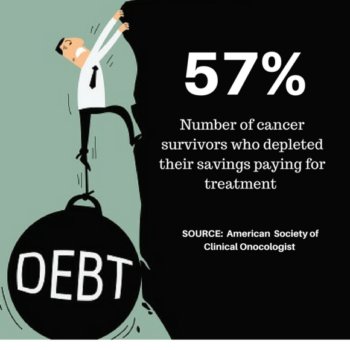Whenever I have questions about credit issues and how to best allocate money, I call my friend Joan Reading who heads the nonprofit Credit Counseling Center, which has a few locations in suburban Philadelphia.
CCC helps people dig out of credit card debt, plan for future purchases such as a house and raise their credit score so they can get the best deals out there, all for free.
What I love about Joan, is that no matter what I ask her, she always gets me to immediately focus on THE most important thing. So when I pitched this blog post to her, the first thing she said to me is: “Your biggest challenge is your health and staying focused on that.” Suddenly, I felt like a human being and not a hot, steamy mess.
And then Joan gets practical. “If you are incurring any debt, first thing to do is examine household expenses. Cut or eliminate other expenses to leave room for growing medical expenses,” she said. The idea of “growing” medical debt makes me shudder. But I know that’s a reality I have to brace for, as is so much about spending the rest of my life living with an unpredictable disease.
Then, she speaks to me as a writer: “Get creative,” she said. Whether it’s food costs or cutting back on things I don’t need to spend so much on such as cable or a data plan on my phone, I can look at is as a creative challenge and not as deprivation. She tells me to keep in mind, there’s nothing out there “more important than YOU.”
“Contact the medical provider and ask if there is a payment plan you may qualify for based on your current income. Try to negotiate a lower repayment plan,” she advised. Check. Done that.
“Medical debt in and of itself is often not on your credit report. When the debt goes to collection for non- payment it shows up on the report with the collection agent,” she said. And that’s where I need to be wary, so start the conversation early, she said.
“It is best then to make even a small payment towards the debt. Many hospitals will take small payments,” she said.
Like my friend Tina Jordan who dug herself out of $1 million in medical debt, Joan tells me to examine medical bills critically. “There are often errors with coding the bill, which plan covered what item. Question the items on the bill for accuracy. Humans make mistake all the time,” she said.
Yes, I’ve waged that battle and so far lost it, although I’m waiting to see how the financial aid end of things will play out.
“Bankruptcy is a remedy used by many when the debt exceed their ability to repay any debt (except student loans). It’s the last resort but usable for medical debt,” she said. Please, let’s not go down that road just yet, although millions of people do each year, according to NerdWallet Health.
“Reduce other expenses. Ask for help from family, medical providers, legislators, and drug companies if they have access to less expensive drugs,” she said, echoing Tina’s advice.
“The bottom line is your health, then planning,” she said. You can see why I like Joan so much.



